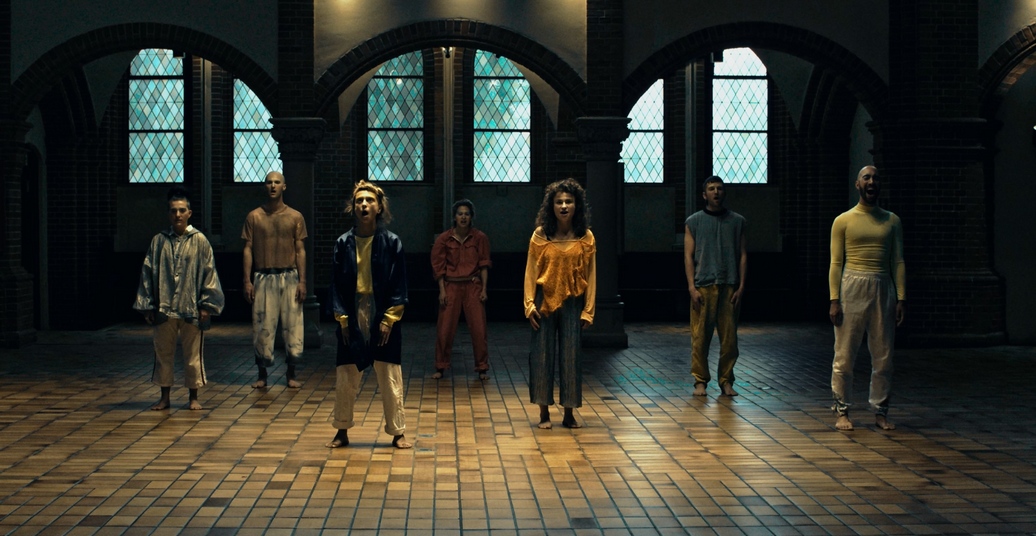Danilo Andrés’s most recent piece ‘Schräger Vögel: A Queer Choral’ was choreographed and rehearsed in the darkness of Berlin’s pandemic winter. A filmed version premiered 29 May 2021 during the Performing Arts Festival Berlin. Devised for a group of non-binary and queer performers, this short and intense study into the physicality of guttural singing and yelling was pertinently filmed in the middle of the huge, brick-built nave of the Reformist Church in Moabit. Andrés’s idea of questioning social norms through the embodiment of unconventional vocal techniques is highly appealing, however, the show ends too quickly to allow it to fully unfold.
Yelling, crying, and screaming are not only physical acts. They can also effectively deliver a powerful political statement — and this aspect is frequently used in contemporary dance, for good or for bad — but the pieces that explore the subversive potential of these vocal techniques are rare indeed. Danilo Andrés has devised their ‘Queer Choral’ around a simple and bright idea. They brought together seven non-binary performers, had them learn the basics of throat singing and growling, and then set their work in the middle of a sacred space providing fascinating acoustics. As Andrés explains, these non-classical vocal styles question common notions of harmony and beauty in the ‘Western’ world in the same way as queerness defies the gender binary.
The show opens with the seven dancers standing motionlessly. After a few minutes tension starts to build as the raucous sound of their breathing, amplified by the church’s echo, grows louder. As the performers start twisting and twirling their necks and heads, swiftly breaking the static character of the opening scene. Each performer now follows their own individual singing routine: some use their best throat singing skills to voice indistinct ballads, while others groan, wail, or shriek. The dancers dash to the corners of the nave, then form into solos or trios. Their movements are largely individual, and, quite probably, derive from a series of improvisation sessions. At one moment, arm movements start to stand out and I notice that they indeed appear to be embodying diverse birds, imitating flaps of wings, or a cautious, crawling way of walking. But their bodies are also bellows full of air, swelling and constricting, erupting with vicious dance patterns and haunting sounds. Suddenly, after 15 minutes, one dancer stands still and starts yelling. The sound comes from deep within them and makes my blood freeze. Their fellow performers collapse to the floor, the cry builds, and then suddenly stops, leaving me in a dizzying silence in front of a black screen.
The Reformist Church in Moabit offers a dramatic backdrop to ‘Schräger Vögel’. The way the performers’ voices resonate under its monumental nave is haunting and yet crystal clear. I often close my eyes and imagine a dark ritual exorcism, or a flock of strange birds fighting for their survival. And despite the piece’s perhaps slightly too literal imitation of bird movements, the dance vocabulary is exuberant and visceral. In the end, however, I feel that this show would have benefitted from having more plot twists and a lengthier exploration of the political effects of the uncanny vocal techniques — which represent a treasure trove of dramaturgical possibilities that contemporary dance ignored for too long. Instead, ‘Schräger Vögel: A Queer Choral’ ends at exactly the moment where it brings me to the edge of my seat. While Andrés starts their work with a fascinating idea and a skilled and dedicated cast, I have the impression that they have many tricks left up their sleeve. Their uncanny birds do not fly far enough and I am left craving a longer journey.
The video of “Schräger Vögel: A Queer Choral” is available online.
Credits:
Direction & Choreography: Danilo Andrés; Performance: Rheremita Cera, Cristina Negocioiu, Evgenia Chetvertkova, Tarlie Lumby, Roc Gottschalk del Pozo, Harald Stojan, Marcell Proske; Voice Coaching & Sound Design: Rheremita Cera, Harald Stojan; Camera & Videography: Elisa Daniel (Trailer), Ādriān Āngěhrn, Ryan Fallon (Filmversion). Organized by pio_near in cooperation with REFO Moabit. Funded in the programme “Third Places” of the EKBO.




